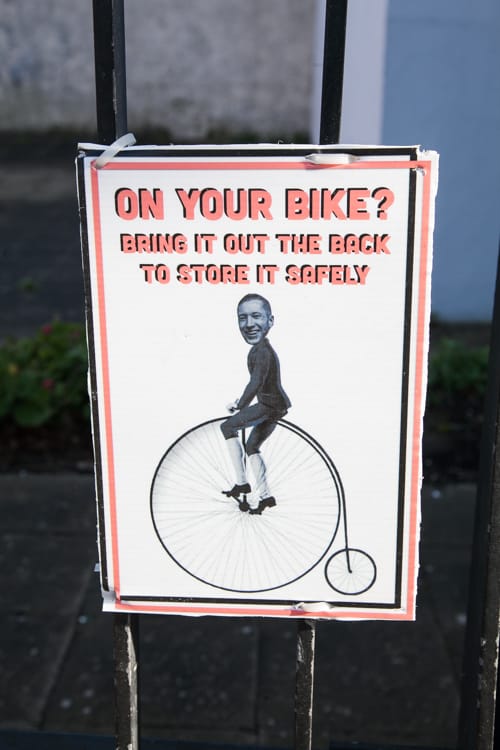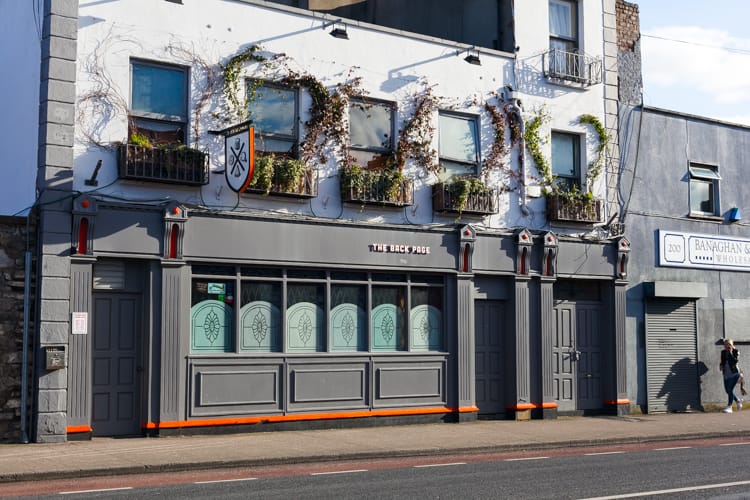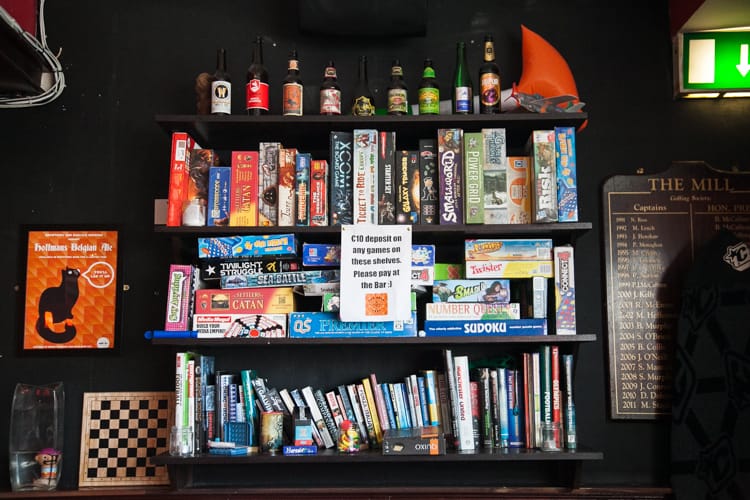Nobody caught illegally dumping yet by new north inner-city CCTV
But the scheme is a success, said a council official's report, as that shows the cameras are a deterrent.
In the last couple of years, Bodytonic has opened one pub after another, expanding into neighbourhoods far from the city centre. What’s their plan?

For Ian Alvey, the last 18 months have been insane.
As chief bottler-washer and one of the main players in Bodytonic, he’s helped open four bars in that time, as part of the company’s rapid expansion into the Dublin pub scene.
Established in 2000, Bodytonic was borne out of frustration on the part of its founder. In order to get gigs for his fledging career as a DJ, Trevor O’Shea started the company as a collective of like-minded creative types and promoters. Initially running gigs and club nights, it has since morphed into a different beast altogether.
The company today now runs a host of venues, runs music events and is involved in a number of food and drink festivals.
Over at the Back Page in Phibsborough, one of five pubs now under Bodytonic ownership, Alvey sits down for a chat. It’s just after 5pm on a Thursday. In one corner, two lads rattle Connect Four pieces into the grid while at the other end of the bar, the pizza chef fires up the oven.
Having come on-board six years ago, Alvey now heads the brewing end of operations and manages two of the Bodytonic bars: the Square Ball, off Holles Street, and the Back Page.
He hasn’t far to travel to this particular location. He lives upstairs with co-conspirator Brian Hoffman, his black-and-white tabby cat.

It’s been a shaky few years in the pub industry.
Between 2007 and 2011, there was a 28-percent decline in sales, according to the Drinks Industry Group of Ireland (DIGI). But then, came an uptick.
In January, DIGI noted that pub sales were up 6.4 percent from October 2014 to October 2015 as it released a sunny report on the Christmas-season sales, suggestingthat they were also better than the previous year’s.
The market has stabilised since the recessionary slump, yet Bodytonic are conscious that to stay in the game, you have to try a little harder these days. A Wicklow native, Alvey grew up with the impersonal prototype of the boom-years watering hole.
“I’ve worked in bars since I was 13 years old,” he says. “I remember the Celtic Tiger days when all you’d do was open the door, serve expensive beer and you were full. Maybe put on a band at the weekend and that was it.”
Dissatisfied with this inadequate incarnation of the local, O’Shea, Alvey and team set about establishing pubs where they, themselves, would want to drink.
With the profits from running club nights such as WAR on South William Street, and operating the Twisted Pepper on Abbey Street they made their first venture into the industry.
In 2006, Bodytonic took over Brannigan’s on Richmond Street and created the Bernard Shaw.
“Was it a risk?” asks O’Shea. ‘In hindsight, not really because it’s gone on to do really well, but at the time, it was our first proper business and, unlike gigs, which you do and then they’re over and you walk away, with this, we couldn’t.”
It wasn’t until 2014, though, that the empire really began.
In July 2014, MVP arrived on Clanbrassil Street. With classy cocktails and monthly singalongs, it’s proved a hit with locals.
That November, Phibsborough got its first new pub in years when the Back Page, a sports bar, came to town. Nine months later, in September 2015, the Square Ball, a Southside alternative to the Back Page opened on Hogan Place.
Wigwam, opened last November, provides a more grown-up feel than its predecessor the Twisted Pepper. Incorporating everything from cocktails and food to the Boxcutter Barbershop (downstairs), Vice Coffee and the Dublin Doughnut Company, it’s “the Twisted Pepper’s mature older brother,” says Alvey.

While many Dublin pubs seem satisfied to offer up the old standards on draught, recent years have seen places like P.Macs and Cassidy’s champion the craft-beer phenomenon.
With Brewtonic, the Bodytonic crew have gone a step further and created their own beers from scratch. Alvey heads up this part of the enterprise, and works closely with Rascal’s Brewing in Rathcoole, to create the range on offer.
“To date, we’ve brewed nine beers. Some are one-offs and others are here for the long run,” he says. “We’re more interested in brewing some of the styles you wouldn’t usually see coming out of an Irish brewing company, and brewing on such a small scale makes that much easier to do.”
Their most popular, he tells me, is Sim Simma Hemp Ale. As Bodytonic employs a number of Wicklow expats, Alvey says, “we have a bit of a reputation for being hippies at heart, so this beer made perfect sense”.
Each week, Alvey and others meet in a bunker space at the back of the Bernard Shaw, their laboratory for trialling new ideas. While inspired by the likes of Beavertown and Kinnegar breweries, the rest, he says, is “just random”.
“I spent three hours today researching using rainwater in your brew to find out it’s mainly unadvised,” he says. “I’m still going to give it a shot though.”
Each brew is available across the five pubs. Although cocktails feature heavily in the Bodytonic pubs, and the old reliables like of Guinness are on draught, the Brewtonic concoctions take on the likes of Galway Bay Brewery and Trouble Brewing in the marketplace.
While this has added to the pubs’ profits, the grub on offer has also gone some ways to ensuring that the punters return.
Just as each pub plays on a different theme, the food menus vary.
The Bernard Shaw is by now famous for its big blue double-decker bus serving up pizza, calzones and salads, ranging in price from €8 to €11.
The Back Page has its own sports-themed pizza menu. Priced between €9 and €12, each pizza is named after an Irish or international sports star.
For example, the Ayrton Senna (tomato, mozzarella, gorgonzola, parma ham, fresh organic pear) and the Billie Jean King (tomato, mozzarella, organic baby spinach, choriza, organic wild mushrooms, free range egg).
Over at MVP, you’ll find Spudbox, which pimps up the humble baked potato, with toppings from chilli con carne to oodles of cheese.
Next, Fowl Play will open at the Square Ball, cooking free-range chicken over wood-fired rotisseries and smokers.
Wigwam has both lunch and dinner menus. It serves toasties and salads by day, and, in the evening, chef Pedro Feraz channels his Brazilian roots with picanha rump steaks with farofa, and mini brisket sambos.
It’s a far cry from the days when Alvey would find himself unblocking toilets in the down-at-heel Twisted Pepper.
“I managed the Twisted Pepper for five years,” says Alvey. “It does leave a serious void in my life now it’s gone, but its legacy will live on. But in terms of layout, decor, drinks and food, Wigwam is far superior than it ever was.”
For many, it’s a natural progression from the clubbing days, evidenced by the gang of lads who’ve just left with their Vice coffee. “Got any yokes?” one asks his mates, chuckling off down Abbey Street.

The team leases the buildings and then moves in and creates a different theme and feel with each new offering.
As a business model, it’s smart. They try to sidestep the words “chain” and “franchise”, as each pub gets its own, idiosyncratic decor and feel.
“Ideas are never a problem, “says Alvey. “It’s just finding the time to execute them all and the right location.”
With the exception of the Twisted Pepper they’ve largely avoided major city-centre locations. Taking over old pubs that had run their life cycle has been their modus operandum. As Alvey notes, though, it’s been “a mixed bag”.
“When you get into things like designing whole new heating systems from scratch in a new pub, it can be a real ball ache,” he says. “There were plenty of evenings where you’d consider a stick of dynamite might just be the easier option.”
O’Shea says the properties are key.
“MVP on Clanbrassil Street? I viewed the very same place a year previously, and I just walked up to where the bridge was beside it and got a view of the whole area and for some reason it just clicked in my head,” he said. “With the Bernard Shaw and the Back Page, it was love at first sight. MVP was more of a slow-burner – it took me a year to actually go for it.”
The pub trade is often considered to be a traditional, if-it-ain’t-broke kind of industry. Many pubs find their strength in taking few risks, and sticking with what has worked for decades, or even centuries.
In Glasnevin, tucked away in Prospect Square, John Kavanagh’s, also known as the Gravediggers, has maintained its aesthetic since it first opened in 1833.
The nicotine-stained ceilings haven’t been given a lick of paint in decades, and although it now offers a tapas menu in the lounge section, co-owner Anne Kavanagh says, “There’s no music, no singing, and no wifi and we won’t be changing that.”
Anne’s brother Ciarán explains that when their father Eugene bought the pub in 1973, he insisted there’d be no shenanigans on site. It’s a policy that works for them; talk to each other, not your phones.
The pub is famous for its insistence, in February 1984, that the funeral party of Dubliner Luke Kelly remain much in the same vein as the dearly departed: silent as the grave.
While the Diggers benefits from knowing where it stands, each new location for Bodytonic is a risk.
And where larger companies invest piles in market research to find out exactly what it is the customer wants, Alvey and company have taken an inward approach.
“We do what we love really,” he says. “It’s usually selfish enough, we’re just lucky there’s a few people that dig it.”
With hard graft and the avoidance of massive capital investment, as well as the steady building of a customer base, costs are kept low. The food and drink helps.
With five pubs now under their belts, and a host of food festivals and music events to run, Bodytonic have cemented themselves as a juggernaut of the Dublin entertainment scene.
Yet there’s always competition.
Earlier this month, Dublin-based Capital Bars and the Mercantile Group merged. With 12 bars in their portfolio, including Café en Seine and Opium, they now control some major players of the Dublin pub scene. Mega-pub chain JD Wetherspoon now has four bars open across the city with a fifth location set for Camden St.
Alvey and company say these big players don’t concern the Bodytonic team, though.
“Pubs like ourselves wouldn’t be worried about it,” says Alvey. “People go out to experience something, and I wonder, long-term, will they struggle as they fail to live up to that unique stalwart of an Irish pub: the fucking craic.”
On a growth front, 2016 is going to be “all about consolidation and a little more meditation,” says Alvey. With five pubs now to look after, plus everything else they’re into, the crew have their work cut out for them.
Yet, with “Trev O’ Shea, good staff and a bit of imagination”, says Alvey, in a city the size of Dublin, “it’s there for the taking if you want to work for it.”